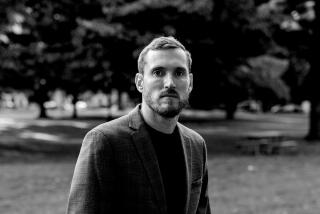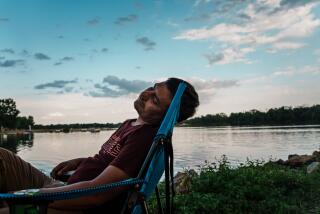Caught in the Crossfire by Jan Goodwin (Dutton: $18.95; 320 pp.)
Why would Jan Goodwin, executive editor of Ladies Home Journal, leave her comfortable New York office to spend three months in the dangers and discomforts of Afghanistan’s war zone? And why isn’t the world reading about a war in which more than a million people have been killed, which has caused the largest refugee concentration in the world today? These are questions that author Goodwin herself asks in “Caught in the Crossfire,” her gripping, highly readable account of a series of secret trips into Soviet-occupied Afghanistan, disguised as a man and accompanied by Mujahedeen resistance fighters.
Goodwin is a consummate journalist with a solid background in news reporting, from covering the war in El Salvador to working beside Mother Teresa in the slums of Calcutta. It is the second question that motivates her, from covering Afghan refugees in Pakistan and a quick trip across the border in 1984, to several dangerous excursions with the resistance in 1985. The more Goodwin sees of the war and hears of Soviet atrocities, the more she realizes the story must be told: “Today the war in Afghanistan has been labeled genocide,” she writes. “In a world that vowed ‘Never again’ after the Holocaust of World War II . . . why were they being silent now?”
Goodwin intersperses passages of compelling narrative of Mujahedeen operations and terrifying bombing attacks with introspection and with thorough and accurate background information. She is an excellent observer, faithfully recording conversations in English and translations of other conversations and interviews, always keeping the poetic feel of Afghan diction.
Goodwin is present in the narrative, and we grow to admire her as she climbs steep mountain paths by night and goes days without food, wondering whether she can keep up. She is vulnerable, readily admitting her fears without dwelling on them. But her presence is unobtrusive, and the book is first and foremost about ordinary Afghan people.
Goodwin’s Afghans are human, not heroes and not fanatics. Because she is a woman, many of the young freedom fighters confide in her, and one even calls her “Mommy.” Her companions, Tor, Wakil and Hamid, are young men who had high hopes and are now following their duty to faith, family and nation by fighting the Soviets. Tor had wanted to be a surgeon but now must be a field surgeon. Hamid had hoped to study law, and Wakil had studied business administration. We feel with them as they tell Goodwin how they miss their families, and especially as Tor, the cheerful clown, confesses that he wishes he had been “martyred” instead of his best friend.
The greatest strength of “Caught in the Crossfire” is Goodwin’s compassion. She feels for her subjects, noticing how a lonely Soviet POW cuddles a kitten and tries to prop up a broken sunflower. When two little girls for whom she had made paper dolls are killed in a bombing attack, she is in tears, wondering whether the village was bombed because of her presence.
Goodwin is probably the first journalist to report personally on both sides of the war. As journalists who have traveled secretly into Afghanistan are not given official Afghan visas, she used her first name Pamela and her British passport rather than her American to travel legally to Kabul, Afghanistan’s capital.
Goodwin’s apparently sincere Marxist guides give rosy accounts of a peaceful new socialist order, and she counterpoints their comments with her own observations of the Afghan countryside and with firsthand accounts of torture and imprisonment gleaned from refugees in Pakistan.
Later she also journeys to the Soviet Union to interview families of soldiers who died in Afghanistan. One family feeds her the party line, but another breaks from it to tell her, “Write that our kids don’t want to go.”
Reporting on Afghanistan has never been an easy job, but now, journalists face double jeopardy: from the Soviets, and from the Pakistan government, which is bowing to U.S. pressure to keep American journalists and doctors out of Afghanistan. The fact that Goodwin was arrested by the Pakistanis on her first trip, and yet returned to make several more trips, makes this book that much more important.
Goodwin wonders at one point: “Why was I sitting under a broiling sun halfway up a mountain in a country most people couldn’t place on a map . . . when I could be back in New York in a nice comfortable office? . . . Was the Afghan refugee’s statement ‘A nation is dying, and the world should know’ reason enough?”
Whatever doubts she may have had then, the reward is that not only does “Caught in the Crossfire” at last tell the Afghans’ story, but it is the best book yet published about the war in Afghanistan.
More to Read
Sign up for our Book Club newsletter
Get the latest news, events and more from the Los Angeles Times Book Club, and help us get L.A. reading and talking.
You may occasionally receive promotional content from the Los Angeles Times.







